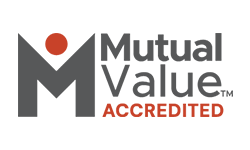G&C Mutual Bank is proud to support Scams Awareness Week. This year's theme Be yourself. Don't let a scammer be you focuses on personal information and identity crime. All scams have the potential for identity theft, and Scams Awareness Week introduces the most common scam types such as online shopping and classifieds scams.
What is an online shopping scam?
Scammers try to trick you by setting up fake websites, or falsely advertising products on a genuine retailer’s website or on social media.
Many fraudulent sellers offer luxury items such as popular brands of clothing, jewellery and electronics at very low prices. Sometimes you will receive the item you paid for, but it will be fake, other times you will receive nothing at all.
According to Australia Post’s Inside Australian Online Shopping 2019 eCommerce Industry Report, over a third of Australian households shopped online in 2018. This year, cities across Australia went into lockdown during the COVID-19 pandemic driving many people to shop online.
Online shopping scams are not limited to online retailers, as scammers often set up fake ads on classifieds websites and trick you into thinking that you are dealing with a legitimate contact. Scammers also pretend to be genuine buyers, so it’s just as important to be careful when selling items on classifieds.
While shopping or selling online has its benefits, it’s important to take practical steps to keep your personal information safe.
How to protect yourself
- Research
- Shop from known and trusted retailers or do your research on a seller before buying from them.
- Conduct an online search using the exact wording in the ad; many well-known scams can be found this way.
- Search online for independent reviews about the seller.
- Don’t trust a website or an ad just because it’s been advertised on social media, appears in classifieds or in a reputable newspaper, or claims it’s endorsed by a celebrity you recognise.
- Stop and think
- Be wary of any offer that seems too good to be true.
- Don’t rush or be pressured by ‘limited offers’ or end-of-sale ‘countdowns’—scammers always try to create a sense of urgency.
- Pay securely
- Use secure payment methods such as your credit card or PayPal.
- Avoid paying by non-secure methods such as wire or bank transfers, money orders, pre-loaded gift cards and electronic currencies like Bitcoin. It’s rare to recover money sent this way.
- If you are a seller, be wary of any buyers claiming that they have overpaid and asking for a refund of the excess, known as an ‘overpayment scam’. Scammers falsely make it appear as though they have sent you money. Instead, you send the scammer the ‘excess’ money and possibly the product.
- Don’t overshare
- If you are signing up for a loyalty program or creating an online shopping account, limit the amount of personal information you share. Consider checking out your shopping as a guest or leaving non-mandatory data fields blank.
Need help?
If you believe someone has gained access to your personal information, even if the scam appears unrelated to your finances, you should contact your bank immediately. A timely response can be critical in giving you the best chance to stem any loss.
- If you have concerns about your G&C Mutual Bank account contact us on 1300 364 400.
- If the scam occurred on social media or a legitimate website, report it to the platform involved. For scams on Facebook, Messenger, WhatsApp and Instagram, see this step-by-step guide for reporting scams on Facebook services.
- You can find out how scams work, how to protect yourself, what to do if you’ve been scammed or report a scam to the Australian Competition and Consumer Commission (ACCC) via the Scamwatch website.




